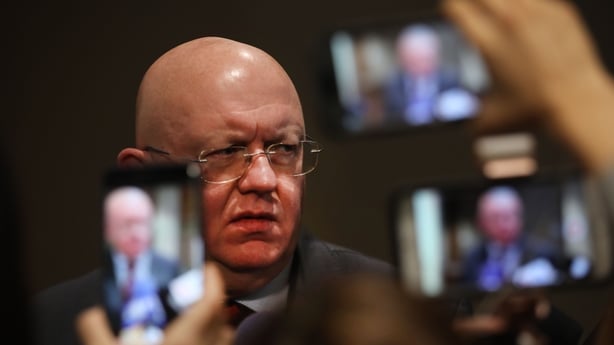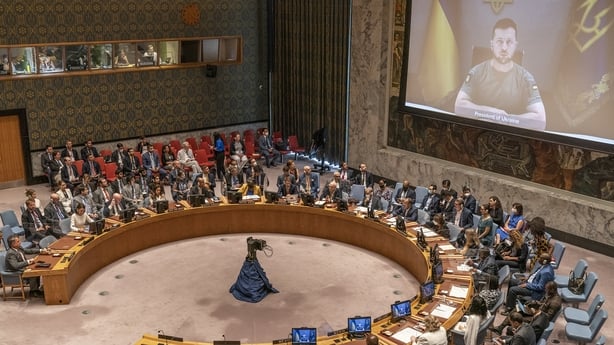The last time Russia assumed the presidency of the UN Security Council, it invaded Ukraine.
One year later, it's preparing to take the chair again to preside over the UN’s most powerful decision-making body.
"Odious" was how one European diplomat put it.
But diplomats acknowledge that Russia’s presidency is in line with protocol, as the presidency of the UN Security Council rotates by alphabetical order.
And the job is largely procedural. Aside from chairing meetings, the presidency does not come with any additional powers.
A country that has invaded its neighbour chairing meetings on "threats to international peace and security" is certainly bad for optics, diplomats agree. But there is little they can do.
"A country that flagrantly violates the UN Charter and invades its neighbour has no place on the UN Security Council," a spokesperson for the United States UN mission told RTÉ News.
"Unfortunately, Russia is a permanent member of the Security Council and no feasible international legal pathway exists to change that reality", the spokesperson added.
On 23 February 2022, while Russian troops were massing on the Ukrainian border, Russia chaired a late-night security council meeting.
UN Secretary-General António Guterres kicked off proceedings. Looking into the camera, he made a direct appeal to Russian President Vladimir Putin.

"Stop your troops from attacking Ukraine. Give peace a chance. Too many people have already died," he said.
Minutes later, the phones of the delegates in the room lit up with breaking news: Russian tanks had rolled across the border.
"I saw the secretary-general’s aide tap him on the shoulder. The secretary-general then slumped in his chair and put his head in his hands," a council diplomat told RTÉ News.
The war that started that night has ground on ever since, at the cost of tens of thousands of lives and millions of people displaced.
Ukraine is not expected to attend any council meetings during Russia’s presidency, in protest.
The Ukrainian mission has called for the Russian Federation to be ejected from the security council, on the basis that it has no right to the seat held formerly by the USSR.
"I don't think this theory stands up to close scrutiny and it doesn't have traction inside the UN," Richard Gowan, the UN Director of Crisis Group, a think tank, told RTÉ News.
"But it certainly resonates with the wider public, and I suspect the Ukrainians will spend April arguing that Russia's presidency is illegitimate," he said.
Russia will be keen to show its legitimacy by conducting the presidency in a professional manner, a council diplomat told RTÉ News. That will mean scheduling any requested meetings and ensuring the council’s business continues smoothly.
But over the past year Russia has also used council meetings to push back at condemnation of its military action and to voice accusations of belligerence against NATO, and specifically the US for sending weapons to Ukraine.

"We also expect Russia to continue to use its seat on the council to spread disinformation and to try to distract from and attempt to justify its actions in Ukraine, the war crimes members of its forces are committing, and its outrageous violations of the UN Charter," a spokesperson for the United States UN mission told RTÉ News.
"We will continue to call out Russia’s lies and bring credible voices, and facts, to the council," the spokesperson added.
Russia’s Foreign Minister Sergei Lavrov is expected to come to New York on 24 April to chair Russia’s signature meeting on multilateralism, according to information released by the Russian mission to the UN.
The meeting is expected to discuss the defence of the principles of the UN Charter, of which Russia is in flagrant violation, according to other council diplomats.
"I am sure Russia and China will tell us how the US is the root of all evil at the UN," Mr Gowan told RTÉ News.
"So we may see some rhetorical fireworks then, but everyone will shrug and move on afterwards," he said.
But in general, diplomats expect Russia to conduct a "low-key" presidency, in order to show its respect for UN procedure and protect its standing within the organisation, already damaged by its attack on Ukraine.
The first day of the month falls on a Saturday, so Russia will officially pick up the gavel on Monday 3 April, under heavy scrutiny both inside the building and out.






